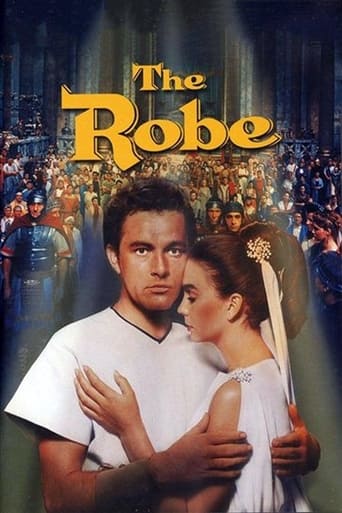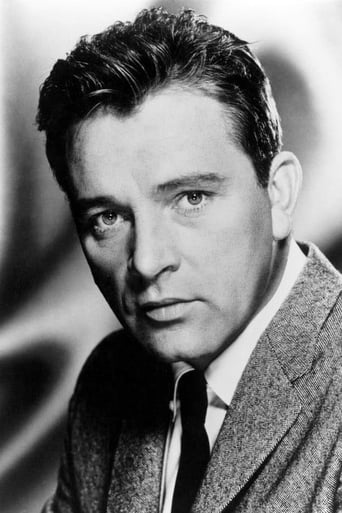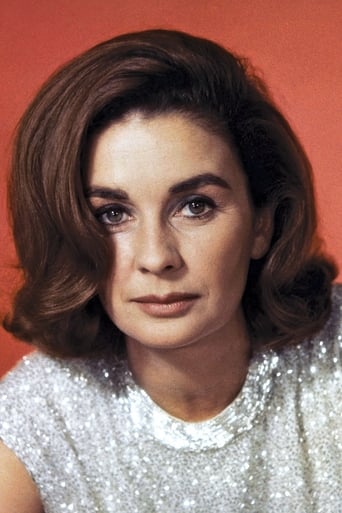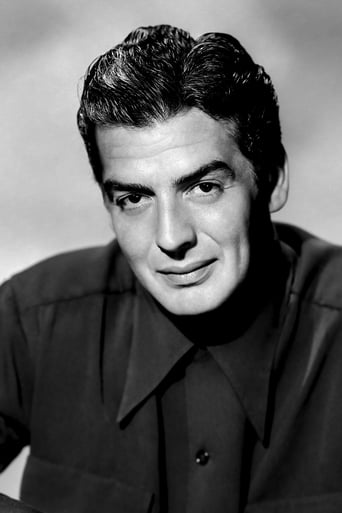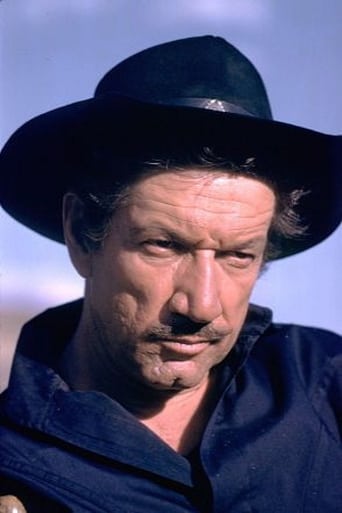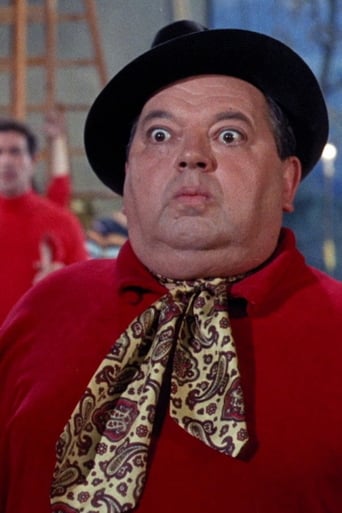HotToastyRag
Everyone knows Ben-Hur was the best biblical movie to come out of the 1950s. (Sorry, The Ten Commandments.) So, go ahead and watch Charlton Heston, and if you're looking for another similar movie that's not quite as good but tries awfully hard, watch The Robe.The good thing about The Robe is the cast. Richard Burton and Jean Simmons can do period pieces very well, and Victor Mature tries awfully hard, so if you like him, you'll be pleased. The story is a little more depressing than Ben-Hur (I know, how is that possible?) because rather than hope and inspiration as a backdrop, guilt and death take their place. Richard Burton plays the Roman soldier in charge of crucifying Jesus, and afterwards, he's wracked with guilt. He's a wonderful actor and gives his all in every performance, so you can rest assured the big dramatic scenes will be well-acted.I think the only reason The Robe falls short in everyone's memory is because of the 1959 classic; maybe if there wasn't another film to compare it to, this one would be everyone's go-to in April. My family watches Ben-Hur almost every Easter, but give this one a try and you might want to vary your yearly tradition. It really is pretty good.
Desertman84
The Robe is a film based on the best-selling novel of Lloyd C. Douglas.It tells the story of Marcellus Gallio,a Roman tribune that was tasked by Pontius Pilate to supervise the crucifixion of Christ.It stars Richard Burton,Jean Simmons and Victor Mature.After the Seven Last Words,Marcellus Gallio wins Christ's robe during a dice game.Gradually,the mystical influence of the said garment allows him to become a changed man from being a cynic and a ladies man into becoming a true believer of Christ.This prompted him to give up his position and decides to become disciple of Christ and preach the Good News which led to his death.Despite of being far from a great film,the movie presents a great theme that would allow to viewer to think of what they would do if they lived during those times.It will definitely provide one some serious thought and probably examine one's relationship with Jesus especially if they happen to Christian.As for the performances,most were alright except for Mature,who provided a credible performance as a Marcellus's converted slave.
James Hitchcock
The historical epics which were so popular in the fifties and early sixties frequently had a religious theme. Some were based, not always faithfully, on stories from the Bible ("The Ten Commandments", "Solomon and Sheba", "Esther and the King"), while others tried to convey a Christian message indirectly. Thus the central character of "Spartacus" is treated as a metaphorical Christ-figure, and "The Egyptian" draws parallels between Christianity and the monotheistic religion of Atenism which briefly flourished under the heretical Pharaoh Akhnaten. "The Robe" is one of a number of films which deal with the early days of the Christian Church and its persecution by the Roman Emperors. The most famous film of this type is "Ben Hur", but others include "Quo Vadis?" "The Silver Chalice" and "The Fall of the Roman Empire". The stories told by such films were normally fictitious- they were often based upon once-famous novels- but were set against a background of historical fact.The plot of "The Robe" is essentially similar to that of "The Silver Chalice" which was made the following year. Both concern a sacred relic of Christ; in "The Silver Chalice" this is the cup which He used at the Last Supper, whereas in "The Robe" it is the robe which He wore at His crucifixion. Lloyd Douglas, who wrote the novel "The Robe", said that he did so to answer the question: what happened to the Roman soldier who won Jesus' robe through a dice game? In the story, this soldier is Marcellus Gallio, the military tribune who commands the unit that crucifies Jesus. He is in some respects an unlikely hero for an epic. The heroes of such films were normally strong, confident men of action like Ben-Hur or Spartacus, but Marcellus is not really a career soldier. He is an upper-class playboy, a gambler, drinker and womaniser who owes his exalted military rank to the influence of his father, an important senator. He enjoys little respect among the men he commands, although he gets the better of a centurion who dares to challenge his authority in a memorable swordfight, one of the film's few action sequences. He is only sent to Judaea because he has offended Caligula, heir to the Emperor Tiberius.After the Crucifixion Marcellus is overcome by feelings of guilt and, haunted by memories of the man he has crucified, loses his reason, believing that Christ's robe has bewitched him. To help him overcome his mental problems, Tiberius sends him back to Judaea, where he meets an idealistic group of early Christians and finds himself drawn to their religion. As one might expect in a fifties epic, Marcellus eventually becomes a Christian himself as do his sweetheart Diana and his servant Demetrius. (Demetrius was to become the hero of his own film, "Demetrius and the Gladiators", a sequel to "The Robe". This sequel was, unusually, based on an original screenplay rather than a novel, although it used some of Douglas's characters. Douglas had in fact written his own sequel, "The Big Fisherman", but the studio did not own the film rights).The film contains a number of historical inaccuracies. The Roman province of Judaea is referred to anachronistically as "Palestine". The historical Tiberius was a cruel and dissolute tyrant, but is portrayed here as a benevolent elder statesman. His wife appears here as the "Empress Julia", although in fact Tiberius divorced Julia for adultery long before he became Emperor, and by the time the film is set she had been dead for many years. The Jews never believed that the Messiah would be the Son of God; that is a purely Christian concept. Most importantly, the Emperor Caligula, although undoubtedly tyrannical, never persecuted the Christians as he is shown doing here; during his reign, only a few years after the death of Christ, the new religion was far too insignificant to pose any threat to the Roman state. (The first organised persecution of Christians took place under Nero).The leading role is played by Richard Burton in the first of his three epic films. (The others were "Alexander the Great" and "Cleopatra"). It is scarcely Burton's finest hour, and he did not really deserve his Oscar nomination, but he acquits himself reasonably well as the complex hero Marcellus. There are also decent performances from the lovely Jean Simmons as Diana, Ernest Thesiger as Tiberius, Michael Rennie as St Peter (although it is difficult to imagine this ascetic philosopher-saint ever having worked as a fisherman), and Jay Robinson, playing Caligula as a ranting, carpet-chewing and slightly camp megalomaniac. Victor Mature as Demetrius is impassive but impressive, like a gigantic statue. (Rennie, Robinson and Mature would all get to repeat their roles in "Demetrius and the Gladiators")."Demetrius and the Gladiators" is, in fact, one of those sequels which is rather better than the film that inspired it. It offers more in the way of spectacle than does "The Robe" and has a more interesting storyline, raising some important moral issues about pacifism, non-violence and Christian forgiveness. With a less stolid actor than Mature in the leading role it could have been a classic. The message of "The Robe", by contrast, never gets much further than "Christians Good, Pagans Bad", and although the conflicted central character of Marcellus does offer some complexity, any attempt at moral depth goes out of the window with the simplistic, sentimental ending to the story. "The Robe" is certainly better than "The Silver Chalice" (I cannot think of an epic which is actually worse than that ridiculous film) but it falls a long way short of the likes of "Ben-Hur" or "Spartacus". 6/10
brtor222
This is my favorite score of Alfred Newman.I find it very haunting and moving and the song of Miriam is very plaintive and beautiful in its simple melody and accompaniment. The love theme of Diana is also very memorable and romantic. I have a soundtrack on CD of this score but the sound quality is very bad, it sounds like they used a mono track as the source for the CD and many tracks that are in the film were not included...I suspect the original LP release did not include them because they would not fit. Is there a better version out there?I am updating my review: The Varese Saraband recording that was issued several years ago on 2 CDs is the most complete version and has great sound and many restored tracks or new tracks that were not previously released. The company only released a limited number of this set, so it is a collector's item by now.Also, I have discovered I think the reason that Mr. Newman's score did not receive an Oscar nomination. There are at least 2 sections from the The Robe (the music of the rescue of Demetrius, and the final Hallejuah chorus) were used previously (albeit in different scoring, but the same themes none the less) in Mr. Newman's score for the 1939 film The Hunchback of Notre Dame for which Mr. Newman received an Oscar nomination then. The Academy's music branch rules would have been very strict at that time in 1953, for eligibility rules for the "Original" score category, thus the score for The Robe was ruled ineligible, since he re-used some music from the 1939 in The Robe.
